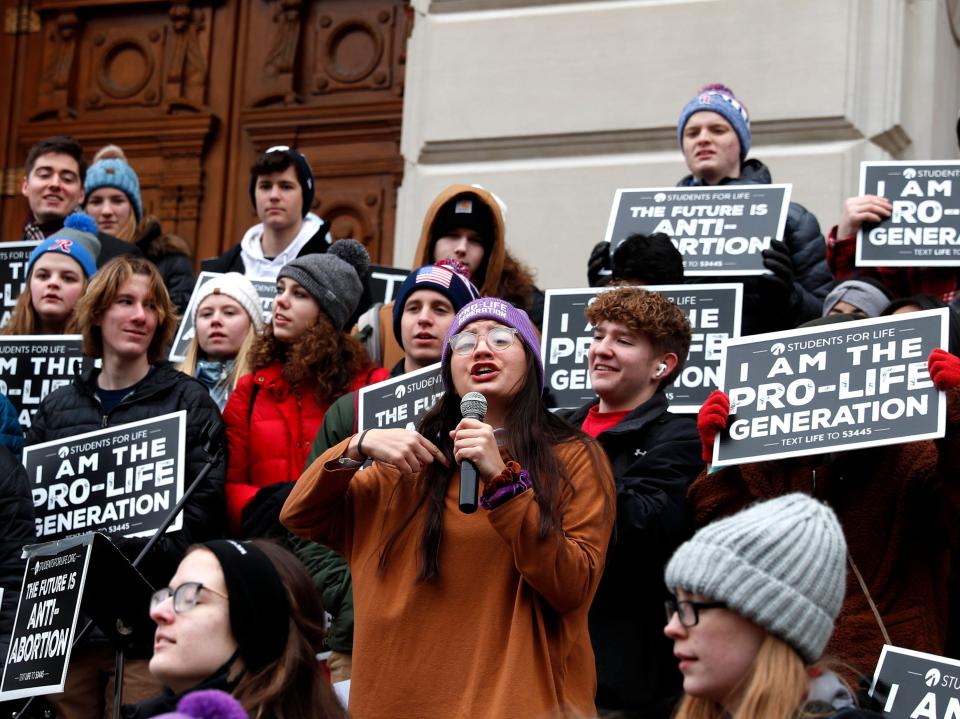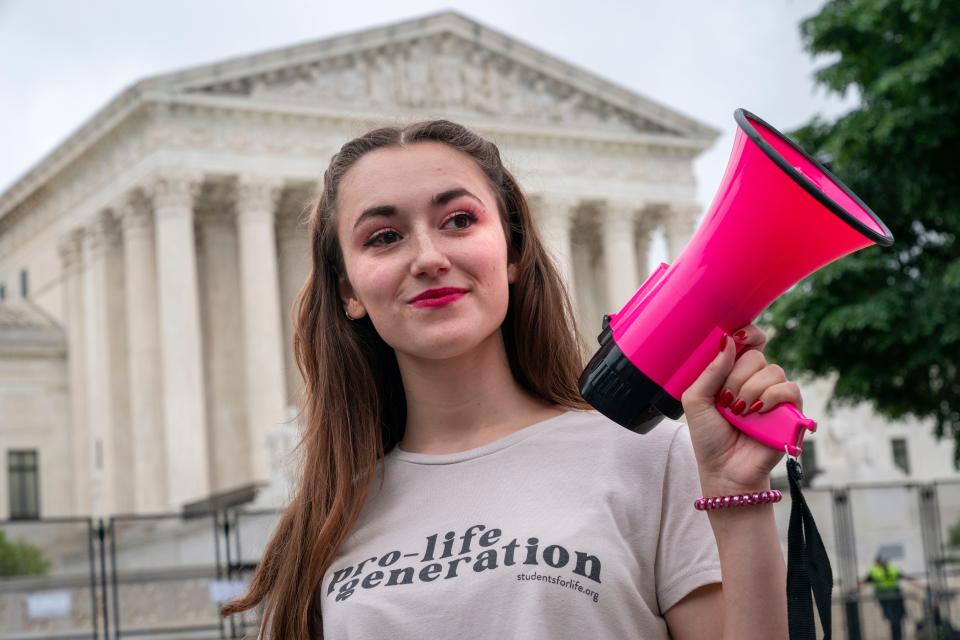The Supreme Court overturning Roe v. Wade is only the beginning for anti-abortion advocates
Fifteen-year-old Elizabeth Reed had already made the appointment to end her pregnancy when she saw a billboard for a crisis pregnancy center that promised help for anyone who was “pregnant and scared.”
Almost 12 weeks along, she thought to herself, “Can y'all see me right now?”
Once she listened to the fetal heartbeat at the pregnancy center she knew she couldn’t get an abortion. She got in the car with her mom after the appointment to tell her she would carry the baby to term. “And she took a deep breath,” Reed said, “and she looked at me and said, ‘OK, well, I'm going home. Where are you going?’”
Reed spent the next six months bouncing between friends’ homes while a volunteer at the pregnancy center tracked her down to make sure she had clothes and food. In the process, she found parents who would adopt her little girl. They named her Betsy.
Now an anti-abortion advocate with Georgia Life Alliance, Reed is one of millions of people around the country who are planning their next steps amid expectations that the Supreme Court is on the verge of overturning the landmark 1973 Roe v. Wade decision that established a federal right to abortion.
The fight over abortion rights is moving to the states, a situation that many anti-abortion advocacy groups said they've been planning for years. Many will be advocating for new laws in statehouses. Several groups say they'll be working to get more support for expecting and new parents. In the immediate term, some groups worry about their safety.
“Honestly, I think it's going to be a wake-up call for some states because our work in the pro-life movement does not stop when abortion is no longer an option,” Reed said. “Our work really just begins."
Broken adoptions, buried records: How states are failing adoptees
The battle moves to statehouses
Because the overturning of Roe will leave abortion laws up to the states, advocacy groups will be lobbying in statehouses to enact more restrictions on abortion.
“Our hands will no longer be tied,” said Carol Tobias, president of the National Right to Life Committee. “You know, we've been able to pass great bills, but there was still always that Supreme Court decision and subsequent decisions kind of hanging there that you can't go too far. Well, now if that's removed, we will see what we can do in more of the states.”
The committee has a "post-Roe Model Abortion Law" with proposals for lawmakers. State lawmakers can choose to include some or all sections of the law in their own legislation.
The “model law” includes four components:
Anyone who performs an abortion (except when the pregnant person’s life is at risk) would be committing a felony.
Anyone who helps a pregnant person (whether physically or through the internet) have an illegal abortion would be committing a felony.
Anyone who manufactures or sells any substances that may induce an abortion would be committing a felony.
Anyone who transports or helps a pregnant minor procure an abortion would be committing a felony.
In states that don’t plan to outlaw abortion outright, Tobias said her committee is still working in those legislatures to make changes like pursuing civil penalties against abortion providers, requiring parental consent for minors to get an abortion, or restricting tax dollars from funding abortion.

Kristan Hawkins, the president of Students for Life and Students for Life Action, said her organization will continue working in statehouses to advance its early abortion model that focuses on ending abortions in the early stages of pregnancy.
In 2019, about 93% of abortions took place in the first 13 weeks of a pregnancy, according to the Centers for Disease Control and Prevention. About 6% took place between 14 and 20 weeks gestation, and less than 1% of abortions took place when a woman was 21 weeks pregnant or more.
Hawkins pointed to Students for Life’s involvement in passing the “Unborn Child Protection Act” in Arkansas in 2021 and Oklahoma’s “Life at Conception Act” in April. The organization has also co-written a model bill banning medication abortions and has supported heartbeat laws, which usually ban abortion at six weeks gestation.
“This is what we’ve been set up to do,” Hawkins said. “Nothing changes in our ground game when the Roe decision comes down. Obviously, there’s going to be a lot more excitement.”
There will be more demand for pregnancy support
Anti-abortion advocates who spoke with USA TODAY said they will support public and private support services for what they call crisis pregnancies. They said they said there would be more demand for these services once the Roe decision comes down, triggering abortion bans in many states.
“That’s going to be a time of chaos,” said Jor-El Godsey, the president of Heartbeat International, which trains pregnancy organizations worldwide to counsel women in hopes they will not have abortions. “We saw that in Texas. A lot of people didn’t understand what was happening.”
Godsey said the pregnancy centers affiliated with Heartbeat International are often staffed by volunteer peer counselors who will listen to a person experiencing a crisis pregnancy. Some will provide material goods for expecting parents, like what Reed received, but they do not recommend or provide abortions and rarely talk about contraception.
“Our job has not been focused on the Supreme Court,” Godsey said. “Our job is helping her in the community. Because frankly, the decision is going to come down and the next day someone is going to find out they’re pregnant and they’re going to be looking for the kind of help that we have.”
Hawkins said Students for Life and its affiliated groups will advocate increasing supportive services based on its existing “Standing with You” model that helps people find public and private resources in their area and advocates against pregnancy discrimination on college campuses.
Hawkins said colleges rarely have information on their websites showing what resources are available for pregnant students. “I can find these really obscure policies on a college website, Hawkins said, “but I’ll be damned if I could find out, ‘Who can she go and talk to if she’s pregnant?’”
Students for Life said it inspired a federal bill called the Pregnant Students’ Rights Act that has not passed.
At the state level, last year the Georgia Legislature passed Betsy’s Law, named for the baby Reed carried to term at 15, providing housing and financial support to pregnant and postpartum people for up to 18 months after birth.
Brian Gibson, the executive director of Pro-Life Action Ministries in Minnesota, said it is no longer enough for pregnancy centers to try to dissuade people from having abortions. He said if a financial burden is the only issue pushing someone to choose abortion, “we want to provide all that’s needed.
“And not just until the baby is born, as we are often accused of,” Gibson said. “We care for these families ongoing for many, many years afterward, sometimes all the way to adulthood for those children.”
Seven members of Congress: Seven personal stories of abortion
People will travel:: What overturning Roe v. Wade could mean for abortions across state lines
Violence expected in immediate aftermath of Dobbs
With crisis pregnancy centers being vandalized and a man recently arrested for threatening Supreme Court Justice Brett Kavanaugh, advocacy groups are preparing for any violence or vandalism that may come their way in the immediate aftermath of the decision.
Shawn Carney, the president and CEO of 40 Days for Life, whose volunteers pray outside of Planned Parenthood clinics, said his group has put together an emergency response plan. He said there will likely be an initial spike in violence, and then tempers will die down.
“The continued vandalism of churches, of pregnancy centers – we’ve already had many attacks on the streets over the years,” Carney said. “Since Donald Trump was president, honestly, that’s when people started noticing us.”
The threat of violence isn’t unique to anti-abortion facilities. Clinics that provide abortions have turned into fortresses with steel doors, safe rooms, and panic buttons in order to protect themselves from anti-abortion activists. The leaked draft of the Dobbs decision sparked more violence against anti-abortion groups' offices.
In Wisconsin, a couple of days after the leak, police said an anti-abortion facility was set on fire and someone threw a Molotov cocktail at it. "If abortions aren't safe then you aren't either,” someone wrote. In Houston, a priest reported vandalism on his church reading, “Pro-Choice is Pro-Life.”

Earlier this month, sixteen senators wrote to Attorney General Merrick Garland saying, "We are deeply concerned that this trend will continue should the Supreme Court overturn Roe v. Wade in the coming weeks unless" the Department of Justice, the FBI, and US Attorneys’ Offices take a firm public stance and proactive response against these violent threats."
“That doesn’t make any sense to me," Godsey, from Heartbeat International said of the attacks on pregnancy centers. "We don’t have any control over the law or the courts or even the future elections.
“It’s hard to understand how that activity is productive on any level,” he said.
Crisis Pregnancy Centers: Lawmakers ask Google to fix abortion searches that mislead users
This article originally appeared on USA TODAY: Anti-abortion advocates say ending Roe v. Wade is only the beginning

